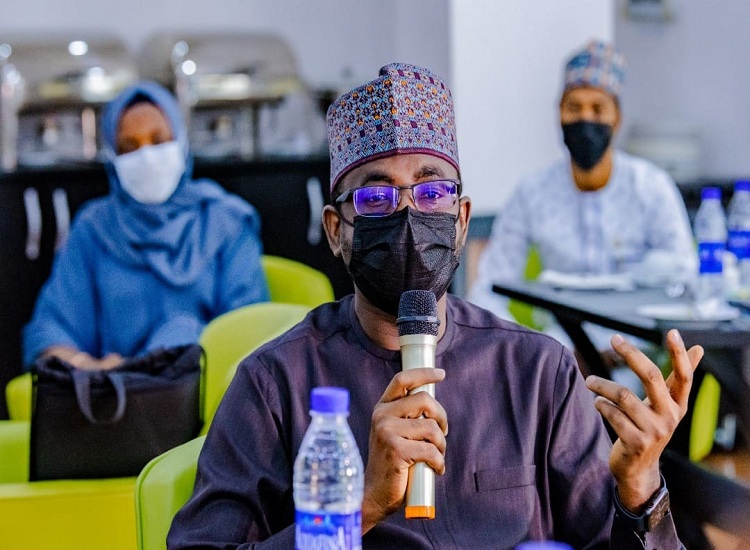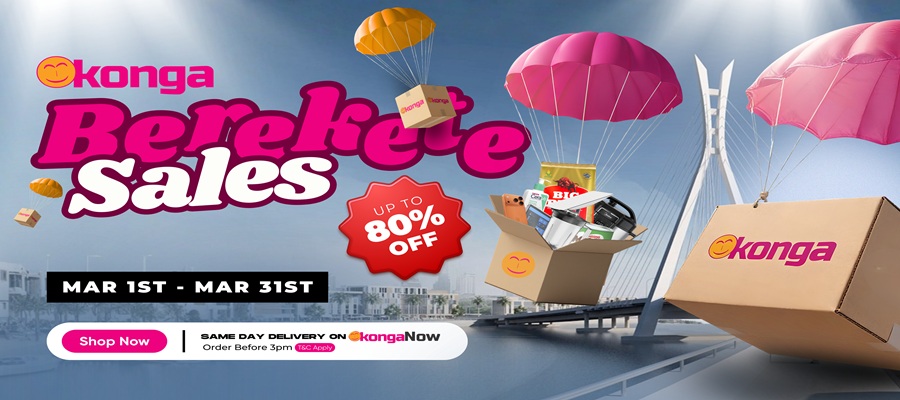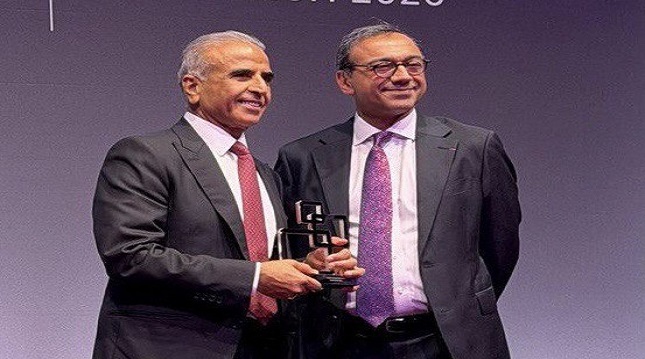Telecom
DG NITDA Charges IT Stakeholders to Disrupt the Status-Quo

Mallam Kashifu Inuwa Abdullahi, director general National Information Technology Development Agency (NITDA), has charged the Information Technology ecosystem stakeholders to disrupt the status quo.

He stated this in Lagos while in a meeting with the IT stakeholders during a three day working visit to the state.
He said, “Come up with new business model, ways to change things, new organizational structure and disrupt the status quo which would accelerate digitalization.”
Mallam Abdullahi said, “As NITDA we look at digital transformation from two lenses, digitization which is using digital technology to enhance existing services and digitalization which is delivering rapid business innovation but to achieve that we need you, the startups. Innovation starts from the startups. We look at innovation as a process, which is taking ideas from inception to impact which can be very difficult.”
The DG said President Muhammadu Buhari has expanded the ministry’s mandates to cover digital economy because communications is just a technology which is a means to an end, but digital economy is using the technology to improve the economic status.
According to the NITDA boss, stakeholders were engaged on the formulation of the National Digital Economy Policy and agencies under the ministry keyed into the implementation of the policy adding that “NITDA’s focus is on the startups and IT stakeholders.”
He said, “We are here to share the Strategic Road Map and Action Plan (SRAP) which is anchored on these seven Pillars: Developmental Regulation, Digital Literacy and Skills, Digital Transformation, Digital Innovation & Entrepreneurship, Cyber Security, Emerging Technologies; and Promotion of Indigenous Content for feedback because the Agency doesn’t exist in isolation” which is the reason we have to carry the Stakeholders along in our implementation processes.”
DG NITDA identified six key strategic stakeholders; the entrepreneurs who innovate and start up business, higher institutions which enhances talent, government which is an enabler, corporate organization who absorb the human capital, venture capital, angel investors funding and the media that will promote the products.
The Director General assured that with the inputs from stakeholders, the government, being an enabler would take immediate steps into all suggestions and concerns raised.
In his remarks, one of the representatives of the Innovation stakeholder, Iyinoluwa Aboyeji from Future Africa, was of the opinion that government must work with the ecosystem to create synergy.
He said “If the government doesn’t work with us as a matter of urgency, everything will crash, variants need urgent intervention”.
He said, “We can’t build talents in Lagos alone, it has to be from all parts of the country. If universities are being provided with laptops and internet connections, we as stakeholders can do the rest, especially when it comes to infrastructure; the government has to partner with private companies as well as building research facilities.
” We have all the available resources but it would only go far when with the government partners with them, he added.
Aboyeji lamented that “the biggest challenge and opportunity facing the Startup ecosystem is that most of its capital comes from foreign countries, unless NITDA empowers local capital, the returns will be going back to the foreign countries and Nigerians will not benefit from it and we have to work together to figure out the concerns that prevents our local companies from being able to incorporate locally.”
Another concern expressed by the stakeholders was the level of employability in IT hubs, how good the startup bill would be, public procurement and how to lower the barrier and the gaps between market and academic research.
Telecom
Konga Launches ‘Berekete Sales’ with Up to 50% Discounts Across Major Categories

Nigeria’s leading composite e-commerce platform, Konga, has announced the launch of its highly anticipated Berekete Sales, a nationwide promotional campaign designed to deliver exceptional value to customers across key product categories.

Konga Berekete
The initiative reinforces Konga’s commitment to affordability, accessibility, and innovation while strengthening its position as a trusted retail partner for millions of Nigerians.
The Berekete Sales campaign features discounts of up to 50% on high-demand categories including Home and Kitchen, Computing, Electronics, Beauty, and Personal Care.
Carefully curated to meet both everyday and aspirational needs, the campaign comes at a strategic period that coincides with Ramadan, Lent, and the approaching Eid al-Fitr celebrations, seasons traditionally associated with reflection, generosity, and family-oriented spending.
Speaking on the campaign, Victor Olaleye, Konga Group Head of Marketing, emphasised that the Berekete Sales initiative reflects the company’s understanding of the economic climate and the importance of value-driven retail experiences. “Berekete Sales is about delivering abundance in savings to our customers,” he stated.
“We recognise that this period is significant for many households observing Ramadan and Lent, and we want to ensure they can access premium products at competitive prices.
“Our goal remains to make quality products accessible while maintaining the seamless shopping experience Konga is known for.”
Among the standout offers is a special deal on the Starlink Gen 3 kit, now available at ₦550,000, reduced from its regular price of ₦590,000.
As the authorised distributor, Konga continues to provide customers with reliable access to the high-speed satellite internet solution, further strengthening connectivity options in Nigeria.
Activation services are available in select cities, ensuring a smooth transition to enhanced internet performance.
In addition, technology enthusiasts can take advantage of an exclusive offer on the Huawei Watch 3, with a special promotion that allows customers to receive two units for the price of one at ₦200,000.
This offer underscores Konga’s strategy of delivering premium lifestyle products with unmatched value.
The Berekete Sales campaign also extends to computing solutions, with attractive deals on ASUS laptops, catering to professionals, students, and businesses seeking performance-driven devices at competitive prices.
Furthermore, customers can pre-order the new Samsung Galaxy S26 Ultra on Konga and receive gift items worth over ₦500,000 from Samsung, a compelling incentive for early adopters and technology enthusiasts.
By aligning its promotional calendar with key religious seasons, Konga demonstrates cultural awareness while providing practical solutions for customers during Ramadan, Lenten observances, and Eid celebrations.
The campaign ensures that households can upgrade their living spaces, enhance productivity, and invest in quality lifestyle products without straining their budgets.
Beyond the discounts, Konga’s integrated ecosystem, spanning secure payment solutions, nationwide logistics, and reliable customer support, ensures a seamless shopping journey from browsing to delivery.
This operational strength continues to differentiate the brand within Nigeria’s competitive e-commerce landscape.
As consumer expectations evolve, Konga remains focused on delivering not just products but complete retail experiences anchored on trust, transparency, and value. The Berekete Sales campaign is positioned to drive significant traffic, boost sales volumes, and deepen brand loyalty across its growing customer base.
With substantial savings, premium product offerings, and time-sensitive deals, the Berekete Sales As the campaign gains momentum, customers are encouraged to visit Konga.com or any Konga retail store nationwide to take advantage of these limited-time offers.
With its blend of spiritual season sensitivity and high-tech accessibility, Konga continues to set the pace for the future of commerce in Africa.
Telecom
Sunil Bharti Mittal Conferred GSMA Lifetime Achievement Award for Transforming Global Telecommunications

The GSMA has conferred a rare Lifetime Achievement Award on Sunil Bharti Mittal, Founder and Chairman of Bharti Enterprises, recognising his role in reshaping the global telecommunications landscape and expanding connectivity across operators, governments, businesses and billions of consumers worldwide.

Bestowed on only a handful of industry leaders in the GSMA’s history, the honour recognises contributions that have left an enduring and defining mark on the global communications ecosystem.
The award was presented at Mobile World Congress in Barcelona in the distinguished presence of His Majesty Felipe VI, the Prime Minister of Spain, Pedro Sanchez, the President of Catalonia, Salvador Illa, and global industry leaders.
A visionary in the telecom sector, Sunil Bharti Mittal has built Bharti Airtel into one of the world’s leading mobile operators, with operations across India and Africa, ranking among the top three globally and serving over half a billion customers.
He pioneered the expansion of mobile services across emerging markets and served as Chairman of the GSMA from 2017 to 2018, where he championed policies that encouraged investment and innovation while strengthening the industry’s commitment to connecting the unconnected and advancing digital inclusion.
He was previously honoured with the GSMA Chairman’s Award in 2008 and again in 2016 for his outstanding contribution to the growth and development of the global mobile industry and was felicitated at Mobile World Congress in February 2019 in recognition of his Chairmanship.
On receiving the award, Sunil Bharti Mittal said, “I am deeply honoured to receive this recognition and sincerely thank the GSMA for this award. I accept it not only as a personal milestone, but as a tribute to India’s telecom journey, the collective spirit of Bharti, and the rise of Indian telecom companies on the global stage.
Equally the award reflects the progress of an industry that has connected billions and belongs to the customers we serve, the teams who built our institutions, and the partners who believe in the transformative power of connectivity.
Telecommunication is a force that expands opportunity, places essential services in the palm of every individual and unlocks human potential. Helping shape its evolution into a powerful accelerator of modern progress has been a privileged responsibility. As innovation accelerates, we will continue to work with our partners & stakeholders to ensure that growth advances equity and creates lasting opportunity for generations to come.”
The Lifetime Achievement Award is a rare honour, bestowed only on select individuals whose leadership and innovation have left an enduring mark on the industry.
Telecom
House Probes Fintech Regulation via Public Hearing on New Commission Bill

House of Representatives is pushing to regulate Nigeria’s fintech sector through a public hearing on “A Bill for an Act to Establish the Nigerian Fintech Regulatory Commission and for Related Matters (HB.2389).”

Speaker Tajudeen Abbas opened the hearing, stressing the need for stakeholder inputs to craft enforceable, constitutional laws addressing regulatory overlaps in digital banking, science, technology, and communications.
Abbas highlighted fintech’s role in Nigeria’s growth via digital payments, blockchain, crowdfunding, and financial inclusion for the unbanked, creating jobs and supporting SMEs under President Tinubu’s Renewed Hope Agenda.
He warned that lagging regulations cause fragmentation, compliance issues, and investor uncertainty, necessitating a coordinating commission for licensing, supervision, standards, and a level playing field without duplicating bodies like the Central Bank of Nigeria (CBN), SEC, NITDA, or NDIC.
The commission would protect consumers, monitor cybersecurity, ensure data privacy, and promote education while complementing existing regulators.
Committee Chairman Emmanuel Ukpong-Udo, overseeing digital banking, banking regulations, science, technology, communications, capital markets, and institutions, called the bill vital for harmonizing oversight amid Nigeria’s rise as Africa’s fintech hub with 430+ firms valued at billions.
Ukpong-Udo emphasized balancing innovation, stability, and coordination to avoid burdens on startups.
Bill sponsor Fuad Kayode Laguda argued the commission would streamline operations currently split among CBN, SEC, NITDA, NOTAP, and FIRS, boosting profitability, user security, and ease of business. He cited 2024-2026 stats: 250-430 firms, $230 billion market projection, $10.6 billion valuation for top nine, and $1.6 billion in mobile transactions.
Fintech stakeholders offered mixed views, with some backing unified regulation and others fearing overlaps with current mandates.

 E-Financial2 days ago
E-Financial2 days agoIran-Israel-US Conflict and CBN’s FX Gains: A Stress Test for Nigeria’s Monetary Stability

 E-Financial2 days ago
E-Financial2 days agoMutual Benefits Assurance Reaffirms Full Regulatory Compliance, Enhanced Governance

 General News2 days ago
General News2 days agoJAMB Uncovers AI-Driven Fraud Targeting UTME Candidates, Warns Parents

 General News2 days ago
General News2 days agoSERAP Asks FCCPC to Investigate Google, Meta, Others over Alleged Rights Abuses

 News2 days ago
News2 days agoTeamApt, Awabah Partner to Boost Pension Drive for Nigerians

 News2 days ago
News2 days agoFlashChange CEO, Bidemi Oke, Urges Startups to Build Strong Governance Structures Early

 Telecom1 day ago
Telecom1 day agoWhy Digital Trust Matters: Secure, Responsible AI for African SMEs?

 Telecom1 day ago
Telecom1 day agoSunil Bharti Mittal Conferred GSMA Lifetime Achievement Award for Transforming Global Telecommunications


























